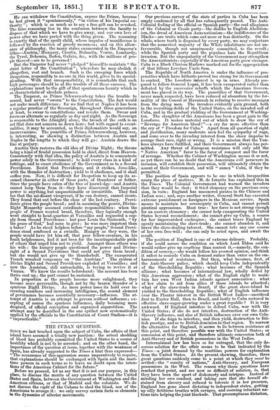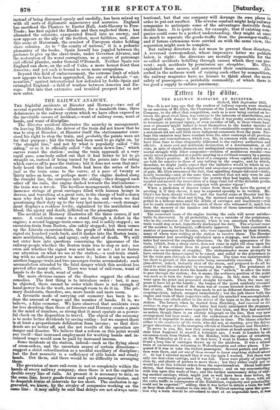THE CUBAN QITESTION.
SINcE we last touched upon the subject of Cuba, the affairs of that island have assumed a totally new position: the actual shedding of blood has probably committed the United States to a course of hostility which is not to be arrested; and on the other hand, the Importance of the question at issue, together with the weakness of Spam, has already suggested to the Times a hint thus expressed-- "The recurrence of this aggression seems imperatively to require, that explanations should be exchanged with Spain and the mari- time powers in such terms as to leave no doubt upon the inten- tions of the American Cabinet for the future."
Before we proceed, let us say that it is not our purpose, in this ewe, to discuss the merits of any question between the United ',Oates and Spain, between the Government at 'Washington and the American citizens, or that of Madrid and the colonists. We do not discuss the right of the Cubans to shed the blood, nor of the Americans to avenge it : we only survey certain facts as elements in the dynamics of ulterior movements.
Our previous survey of the state of parties in Cuba has been amply confirmed by all that has subsequently passed. The Anti- Colonial feeling of the official or Spanish party—the cool allegiance of the Colonial or Creole party—the dislike to English Abolition- ism, the dread of American Annexationism—the indifference of the Blacks—are traits which come out more or less distinctly. On the whole, where truth is disguised by every party, we may conjecture that the numerical majority of the White inhabitants are not un- favourable, though not unanimously committed, to the revolt ; while the Spanish party and the populace hate the Republican invasion. But the unpopularity of the Governmentmay strengthen the Annexationists ; especially if the American party grow stronger. Cuba is a Black Clarissa Harlowe marked out for the appropriation of that bilious Lovelace Uncle Sam.
The Republic of North America is under the influence of pro- pensities which have hitherto proved too strong for its Government to control. The Locofoeo interest is up in arms. Already pre- pared to follow General Lopez, it has been exasperated rather than defeated by the successive rebuffs which the American Govern- ment has placed in its way. The punctilios of that Government, never much respected, have been reduced ad absurdum by the for- mality of the Consul at Havannah in refusing to receive messages from the dying men. The invaders evidently gain ground, both in the recruiting-fields of the United States, on the invaded soil of Cuba, and in the gradual yielding of the Government at Washing-
ton. The slaughter of the Americans has been a great gain to the
Locofocos. It makes material out of which to draw the cry of "Revenge for American blood !"—a cry far more effective than the cry of "Freedom for Cuba." Apart from all question of right and justification, many moderate men feel the sympathy of rage, and come over to the invading interest from the sheer impulse to avenge their race, right or wrong. It is a mission that the Yan- kees always have fulfilled, and their Government always has per- mitted. Any threat of European resistance will only add the "Native American" furor to the furor of conquest and the furor of revenge. Whether the Cabinet of Washington means it or not, as yet there can be no doubt that the Americans will persevere in invasion, will establish their possession, will ultimately obtain the assent of their Government, and will " annex " Cuba, if they be permitted. The position of Spain appears to be one in which ineapacities usurp the place of motives. M. de Isturitz has explained this in the Times. The Colonial Government had warned the invaders that they would be shot; it tried clemency on the previous occa- sion, in vain ; England has massacred pirates in the Chinese and Indian seas ; and, says another writer, General Scott has executed extreme punishment on foreigners in the Mexican service. Spain means to maintain her sovereignty in Cuba, and cannot permit piratical aggressions. Most true : her force is not strong enough for an austere clemency ; she cannot help exasperating the United States beyond reconcilement; she cannot give up Cuba, a source for her impoverished exchequer; she cannot brave England by openly maintaining the slave-trade ; she cannot abandon it, and brave the slave-dealing interest. She cannot take any one course of her own free-will ; she can only be acted upon, and await the result.
The position of England is one of extreme delicacy. Probably, if she could secure the condition on which Lord Eldon said he would rather give up anything than contest it,—namely, the con- dition of secrecy,—she would follow his avowed opinion, and think it safest to concede Cuba on demand rather than enter on the em- barrassments of resistance. But then, what becomes, first, of the Anti-Slavery policy, which should keep Cuba independently of the Slaveholding Republic ; what becomes of the Spanish alliance ; what becomes of international law, wholly defied by this American aggression ; what of the English right to main- tain her own West Indian islands against annexation ; what of her claim to aid from allies if those islands be attacked ; what of the slave-trade in Brazil, if the great slave-island be yielded to the Slaveholding Republic ; what of English influence over the Planter interest in the British West Indies—sacrificed first to Exeter Hall, then to Brazil, and lastly to Cuba restored to effective slave-sugar-growing under a great republic ? It is very awkward. If England interfere to defend Cuba, war with the United States ; if she do not interfere, destruction of the Anti. Slavery influence, and also of British influence over our own Colo- nies. If she feign to interfere, and then yield, destruction to Bri- tish prestige, and so to British dominion in that region. To narrow the alternative for England, it seems to he between resistance at this point, and therefore possible war with the United States ; or concession at this point, and therefore ultimate concession both of Anti-Slavery and of British possessions in the West Indies. International law has been so fax outraged, that the only de- corous solution for the affair seems to be that indicated by the Times—a joint demand by the maritime powers for explanation
from the -United States. At the present showing, therefore, three great questions suddenly come to a point at which they must be settled—the "comity of nations," Anti-Slavery, and European possessions in the West. The reason why those questions have reached that point, and are now so difficult of solution, is, that they have been the sport of dishonesty and intrigue. Instead of minding her own conduct, and taking care that she herself ab- stained from slavery and refused to tolerate it in her presence, England has gone about dictating to independent states, getting up silly fictitious treaties with savages, and coercing reluctant na- tions into helping the joint blockade. That presumptuous dictation, instead of being discussed openly and candidly, has been mixed up
with all sorts of diplomatic maneeuvres seerecies. England has sacrificed the Planters to Exeter TIall, Anti-Slavery to Free-
Trade; has first cajoled the Blacks and then neglected ; has alienated the colonists, exasperated Brazil into an enemy, and now appears as the ally of the feeblest, most faithless and, since this scene at Havannah, the cruelest of European states holding slave colonies. As to "the comity of nations," it is a pedantic pkeeantry of the books. Spain herself has juggled between the pretence to give up the slave-trade, under Governor Alvarez, and the restoration of its worst corruptions as a source of patronage and official plunder, under General O'Donnell. Neither Spain nor England can show, on the soil of Cuba, a more honest front than America; and yet each is bound to seem more scrupulous._
Beyond this field of embarrassment, the extreme limit of which now appears to have been approached, lies one of wholesale "an- nexation," against international law defended by feeble Spain and entangled England—a field of warfare between America and Eu- rope. But into that extensive and troubled prospect let us not now enter.



























 Previous page
Previous page